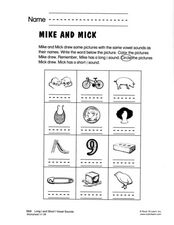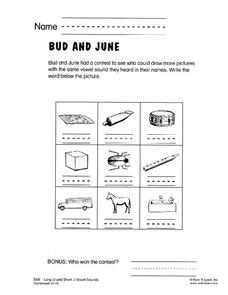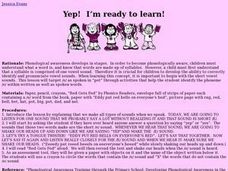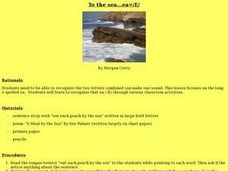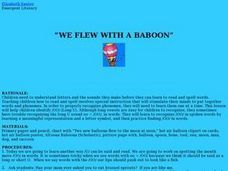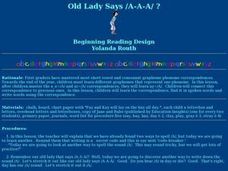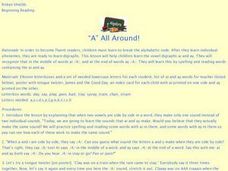Curated OER
Spelling List 2: Sight Words, Short i/o/u Words, and Academic Vocabulary
In this spelling list worksheet, students practice spelling words that are sight words, short u words, and vocabulary. Students practice spelling 16 words total.
Curated OER
Sound the Foghorn
Learners complete a variety of activities related to the long /u/ sound. As a class they recite a tongue twister, then trace and write the letter U. Students then listen to pairs of words and identify which word contains the long /u/...
Curated OER
Mike and Mick
For this identifying long i and short i vowel sounds worksheet, students observe pictures and write their names, color the long i words, and circle the short i words. Students write 24 answers.
Curated OER
Bud and June
In this identifying words with short and long "u" sounds learning exercise, students observe pictures, write their names, and count the short and long "u" words. Students write 10 answers.
Curated OER
Reading Words With Short Vowel Sounds
While just a two-slide review of words with short vowel sounds, this resource could be a good tool to use in a kindergarten classroom. It provides a quick review of simple decoding skills in a visually-appealing manner. There are twelve...
Curated OER
The Everyday Red
Pair a hand motion with the /e/ sound so young learners remember it better! This plan has the class open their "creaky door" whenever they hear the /e/ sound. They'll learn a tongue twister and read the short story Red Gets Fed, both of...
Curated OER
Yep, I'm Ready to Learn!
Tongue twisters give young learners an easy phrase to refer back to when learning letter sounds. Use the phrase "Eddy put red bells on everyone's bed" to identify the /e/ sound. Then read Red Gets Fed aloud, having learners nod their...
Curated OER
How Many Feet Will We Meet?
Emerging speakers distinguish between the sounds for short vowel /e/ and long vowel /e/. They are introduced to the vowel patterns that comprise the long vowel sounds, with emphasis on /ee/. They practice reading and spelling a variety...
Curated OER
Icky Fingers
Which i sound is used in the word icky? Kindergarteners and first graders listen to the short /i/ sound. They practice shaking their fingers to indicate icky when they hear the target sound. Then they practice reading a poster with the...
Curated OER
To the Sea
Improve pronunciation and phonemic awareness in your first and second graders! With this plan, they distinguish between the sounds for short vowel e and long vowel e. They are introduced to the vowel patterns that comprise long vowel...
Curated OER
We Flew With a Baboon
More vowels? Elementary schoolers recognize how vowel patterns change a short vowel sound into a long vowel sound. With an emphasis on the /oo/ that makes the long U sound, kids identify the phoneme and letter combination through...
Curated OER
Bee a Reader
Use a fun tongue twister to help your class remember the /ee/ sound! With this activity, they distinguish between the sounds for short vowel e and long vowel e. They are introduced to the vowel patterns that comprise long vowel sounds,...
Curated OER
Peachy Teacup by the Stream
Help your kids distinguish between the sounds for short vowel /e/ and long vowel /e/. They are introduced to the vowel patterns that comprise long vowel sounds, with a particular emphasis on /ea/. They practice reading and spelling a...
Curated OER
Blast-Off to Blending
Practice working with different phonemes in consonants and vowels. Sounds are written on squares that get put on a rocket to "blast off" and meet other sounds. The teacher first models blending, then reads the new words. Young readers...
Curated OER
I Scream You Scream We All Scream for Ice Cream!
Use letter boxes and example words to help kids distinguish between the sounds for short vowel e and long vowel e. They are introduced to the vowel patterns that comprise long vowel sounds, with a particular emphasis on /ea/. They...
Curated OER
Beat the Heat
Review common digraphs with your early elementary schoolers. They identify the digraph /ea/ in written and spoken language. After a brief discussion, they apply the rule for identifying and spelling words containing the /ea/ digraph....
Curated OER
Icky Sticky Fingers
Practice recognizing the short vowel /i/ in written and spoken language. Introduce the target sound with a fun tongue twister about Lizzy the lizard. Through matching and listening activities, learners discriminate the vowel sound /i/...
Curated OER
Shake With A
Use letter boxes and letter tiles (d,a,y,l,p,w,k,f,r,i,t,s,b,c,I) to help your class distinguish between the sounds for short vowel a and long vowel a. They are introduced to the vowel patterns that comprise long vowel sounds, with a...
Curated OER
Everybody Get Ready
Learners identify and spell words containing the short /e/ sound. They rehearse a fun tongue twister which contains words emphasizing the short /e/ sound. They then read Red Gets Fed as a class. Have your group clap every time they hear...
Curated OER
Itchy Ritchy
Itchy Ritchy can help your learners remember the /i/ sound! First teach young learners the fun tongue twister illustrating the target sound, and have them identify the target sound in other words. Use the reading Tim and the Top to...
Curated OER
Old Ladies Say A?
The letter a produces so many sounds! Increase your class's awareness of concepts related to reading and spelling. They identify the digraphs /ea/ and /ai/ in spoken language and spelling as a long vowel sound. After a brief discussion,...
Curated OER
"A" All Around
Spell and read words containing ai and ay. First and second graders identify vowel digraphs in written and spoken language. After a brief discussion on the combinations of letters that comprise digraphs, they practice reading and...
Curated OER
Open Up And Say Ahh
Who has a word that has an /o/? Teach kids this fun song (sung to the tune of "Skip to My Lou") to remember the /o/ sound and words that contain the target sound. Then have learners identify the sound in various words before reading In...
Curated OER
Spelling Assessment
In this spelling worksheet, 3rd graders solve three riddles. Each riddle contains three clues for two pictured words. The first two riddles refer to words with the same vowel sound. The third requires students to apply the same spelling...




